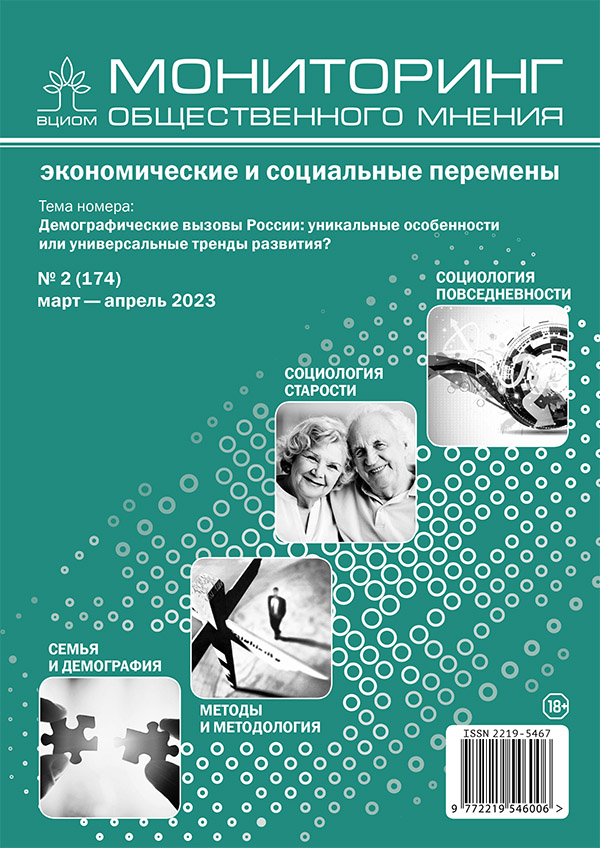The Authorship Experience in Sociology: The Balance Between Institutional Canons and Individual Style
DOI:
https://doi.org/10.14515/monitoring.2023.2.2263Keywords:
sociology of academic life, academic communication, authorship in sociology, publication strategies, writing in sociology, institutional canons of writingAbstract
The article describes the logic according to which sociological authors maintain the balance between individual style and institutional rules concerning text writing. Exploring the academic world of Russian sociology, I attempt to uncover the features of institutional context and how sociologists adapt to the existing “rules of the game”. It is shown that the practice of writing texts is sensitive to the genre. Essentially, the author’s balance between his or her style and institutional canons will change, increasing or reducing the degree of freedom depending on the genre. Writing a research article can be accompanied by a change in the position of the internal critic due to the need to compromise when interacting with publishing platforms and reviewers. Besides, it involves forming optimal publishing strategies, in which preference is given to journals that are tolerant of the author’s vision. I have concluded that the authorship experience in sociology is tied to the context beyond the text’s direct writing — remuneration for meeting publication standards, institutional pressure, and other factors.
Acknowledgment. The article is based on the materials of the master’s thesis defended at the HSE in 2020. This text — as well as the entire study — would not have taken place without people who agreed to an interview and kindly entrusted their stories. The author also thanks Elena Rozhdestvenskaya, Alexey Ryzhkov, Sergey Startsev, and Timofey Alekseev for valuable critical comments.
References
Барт Р. Смерть автора // Избранные работы: Семиотика. Поэтика. 1989. М.: Прогресс: С. 384–391.
Barth R. (1989) The Death of the Author. In: Selected Works: Semiotics. Poetics. Moscow: Progress. P. 384–391. (In Russ.)
Де Кастру Э.В. Каннибальские метафизики. Рубежи постструктурной антропологии. М.: Ад Маргинем Пресс, 2017.
De Castro E.V. (2017) Cannibal Metaphysics: For a Post-Structural Anthropology. Moscow: Ad Marginem Press. (In Russ.)
Мертон Р. Эффект Матфея в науке: накопление преимуществ и символизм интеллектуальной собственности // Альманах THESIS. 1993. № 3. C. 256–276.
Merton R. (1993) The Matthew Effect in Science, II: Cumulative Advantage and the Symbolism of Intellectual Property. THESIS. No. 3. P. 256–276. (In Russ.)
Соколов М. М. Российская социология после 1991 года: интеллектуальная динамика «бедной науки» // Laboratorium: журнал социальных исследований. 2009. No 1. С. 20—57.
Sokolov M. M. (2009) Russian Sociology after 1991: The Intellectual Dynamics of “Poor Science”. Laboratorium: Russian Review of Social Research. No. 1. P. 20—57. (In Russ.)
Фуллер C. Социология интеллектуальной жизни: карьера ума внутри и вне академии. М.: Издательский дом «Дело», 2018.
Fuller S. (2018) The Sociology of Intellectual Life: The Career of the Mind in and around the Academy. Moscow: Delo Publishing house. (In Russ.)
Фуко М. Воля к истине. М.: Магистериум Касталь, 1996.
Foucault M. (1996) le courage de la vérité. Moscow: Magisterium Kastal. (In Russ.)
Bakanic V., McPhail C., Simon R. (1987) The Manuscript Review and Decision-Making Process. American Sociological Review. Vol. 52. No. 5. P. 631–642. https://doi.org/10.2307/2095599.
Becker H. (1970) Sociological Work: Method and Substance. New York, NY: Routledge.
Clemens E., Powell W., McIlwaine K., Okamoto D. (1995) Careers in Print: Books, Journals, and Scholarly Reputations. American Journal of Sociology. Vol. 101. No. 2. P. 433–494. URL: https://www.jstor.org/stable/2782434 (accessed: 28.06.2022).
Hyland K. (1999) Academic Attribution: Citation and the Construction of Disciplinary Knowledge. Applied Linguistics. Vol. 20. No. 3. P. 341–367. https://doi.org/10.1093/applin/20.3.341.
Ivanič R. (1998) Writing and Identity: The Discoursal Construction of Identity in Academic Writing. Amsterdam: John Benjamins Publishing.
Klamer A., Dalen H. (2002) Attention and the Art of Scientific Publishing. Journal of Economic Methodology. Vol. 9. No. 3. P. 289–315. https://doi.org/10.1080/1350178022000015104.
Korom Ph. (2019) The Prestige Elite in Sociology: Toward a Collective Biography of the Most Cited Scholars (1970-2010). Sociological Quarterly. Vol. 61. No. 2. P. 128–163. https://doi.org/10.1080/00380253.2019.1581037.
Lepenies W. (1988) Between Literature and Science: The Rise of Sociology. Cambridge: Cambridge University Press.
Pontille D. (2003) Authorship Practices and Institutional Contexts in Sociology: Elements for a Comparison of the United States and France. Science Technology and Human Values. Vol. 28. No. 2. P. 217–243. URL: https://www.jstor.org/stable/1557953 (accessed: 28.06.2022).
Powell W. (1985) Getting into Print: The Decision-Making Process in Scholarly Publishing. Chicago, IL: University of Chicago Press.
Pfeffer J. (1993) Barriers to the Advance of Organizational Science: Paradigm Development as a Dependent Variable. Academy of Management Review. Vol. 18. No. 4. P. 599–620. https://doi.org/10.2307/258592.
Travis G., Collins H. (1991) New Light on Old Boys: Cognitive and Institutional Particularism in the Peer Review System. Science, Technology and Human Values. Vol. 16. No. 3. P. 322–341. URL: https://www.jstor.org/stable/689918 (accessed: 28.06.2022).
Wolfe A. (1990) Books vs. Articles: Two Ways of Publishing Sociology. Sociological Forum. Vol. 5. No. 3. P. 477-489. URL: https://www.jstor.org/stable/684399 (accessed: 28.06.2022).
Zuckerman H., Merton R. (1971) Patterns of Evaluation in Science: Institutionalisation, Structure and Functions of the Referee System. Minerva. Vol. 9. No. 1. P. 66–100. URL: https://www.jstor.org/stable/41827004 (accessed: 28.06.2022).
Downloads
Published
How to Cite
Issue
Section
License
Copyright (c) 2023 Monitoring of Public Opinion: Economic and Social Changes Journal (Public Opinion Monitoring) ISSN 2219-5467

This work is licensed under a Creative Commons Attribution-NonCommercial-ShareAlike 4.0 International License.






